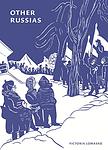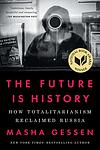The Greatest Russian, Colombian "Nonfiction" Books Since 2010
Click to learn how this list is calculated.
This list represents a comprehensive and trusted collection of the greatest books. Developed through a specialized algorithm, it brings together 286 'best of' book lists to form a definitive guide to the world's most acclaimed books. For those interested in how these books are chosen, additional details can be found on the rankings page.
Genres
Countries
Date Range
Reading Statistics
Click the button below to see how many of these books you've read!
Download
If you're interested in downloading this list as a CSV file for use in a spreadsheet application, you can easily do so by clicking the button below. Please note that to ensure a manageable file size and faster download, the CSV will include details for only the first 500 books.
Download-
1. The Diary Of A Gulag Prison Guard 1935 6 by Ivan Chistyakov
"The Diary Of A Gulag Prison Guard 1935-6" is a chilling and harrowing memoir that provides a firsthand account of the atrocities and cruelty witnessed by Ivan Chistyakov during his time as a guard in a Soviet Gulag prison. Through his detailed entries, Chistyakov reveals the dehumanizing conditions, brutal punishments, and constant fear that both prisoners and guards endured within the oppressive Soviet regime. This haunting narrative serves as a stark reminder of the dark realities of the Gulag system and the lasting impact it had on the lives of countless individuals.
-
2. Other Russias by Victoria Lomasko
"Other Russias" is a powerful and thought-provoking graphic novel that offers an intimate and unfiltered glimpse into the lives of marginalized individuals and communities in contemporary Russia. Through her stunning illustrations and poignant interviews, Victoria Lomasko sheds light on the struggles, hopes, and resilience of diverse groups such as LGBTQ+ activists, migrant workers, political dissidents, and the forgotten voices of rural communities. This eye-opening book challenges stereotypes and provides a humanizing portrayal of those who are often overlooked or silenced in Russian society.
-
3. Lo Que No Tiene Nombre by Piedad Bonnett
The book is a poignant and deeply personal memoir that delves into the heart-wrenching experience of a mother grappling with her son's severe mental illness and eventual suicide. Through a raw and honest narrative, the author explores the complexities of her son's struggle with depression, the impact of his condition on their family, and the profound grief that follows his tragic death. The memoir serves as a meditation on loss, love, and the often misunderstood nature of mental health, offering a touching tribute to her son while also shedding light on the broader issues surrounding mental illness and the challenges faced by those who suffer from it and their loved ones.
-
4. Primera Persona by Margarita García Robayo
"Primera Persona" is a collection of autobiographical essays that delve into the author's experiences navigating the complexities of identity, migration, and cultural dislocation. With sharp wit and unflinching honesty, the author reflects on her life growing up in Colombia, her move to Argentina, and the challenges of establishing herself as a writer in a foreign land. The essays explore themes of family, memory, and the search for belonging, offering a poignant and often humorous look at the intersections of personal history and broader socio-cultural dynamics. Through her narrative, the author invites readers to consider the multifaceted nature of selfhood and the universal quest for connection and understanding.
-
5. The Future Is History: How Totalitarianism Reclaimed Russia by Masha Gessen
This book provides a deeply researched examination of the resurgence of totalitarianism in Russia, focusing on the lives of four individuals born at what promised to be the dawn of democracy. The book explores how, after the fall of the Soviet Union, instead of moving towards a democratic society, Russia has seen a rise in a new form of totalitarianism under its current leadership. It delves into the psychological shift in the Russian populace, the government's use of homophobia as a method of control, and how the internet and social media have been weaponized for political purposes.
Reading Statistics
Click the button below to see how many of these books you've read!
Download
If you're interested in downloading this list as a CSV file for use in a spreadsheet application, you can easily do so by clicking the button below. Please note that to ensure a manageable file size and faster download, the CSV will include details for only the first 500 books.
Download



